|
|
|
Sort Order |
|
|
|
Items / Page
|
|
|
|
|
|
|
| Srl | Item |
| 1 |
ID:
138302
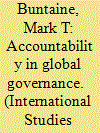

|
|
|
|
|
| Summary/Abstract |
International organizations frequently lack accountability to both states and civil society groups. States often face difficulties monitoring the actions of international organizations. Civil society groups do not often enjoy direct influence over decision-making within international organizations. To address these challenges, states have created accountability mechanisms for international organizations. Accountability mechanisms allow civil society groups to submit complaints about the performance of international organizations. They take the form of ombudsmen offices, accountability panels, and complaint procedures. Little is known about when and why these mechanisms constrain behavior by international organizations that runs counter to the mutual interests of states and civil society groups. Using the World Bank Inspection Panel as a test case, I show that monitoring by civil society groups alters lending at the World Bank when it enhances oversight by powerful states. By combining their abilities in sanctioning and monitoring, states and civil society groups can promote accountability at international organizations.
|
|
|
|
|
|
|
|
|
|
|
|
|
|
|
|
| 2 |
ID:
138297
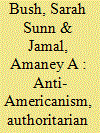

|
|
|
|
|
| Summary/Abstract |
A pillar of American foreign policy in the Middle East since September 11, 2001, has been promoting democracy, with particular emphasis on support for women's representation. Given high levels of anti-Americanism in the region, does foreign pressure for policy reform undermine this project? Evidence from a nationally representative survey experiment in Jordan shows that an American endorsement of women in politics has no average effect on popular support for women's representation. Instead, domestic patterns of support and opposition to autocrats determine citizens' receptivity to policy endorsements, with policy endorsements of foreign-supported reforms polarizing public opinion. Both foreign and domestic endorsements of women in politics depress support among Jordanians who oppose their regime significantly more than among Jordanians who support it.
|
|
|
|
|
|
|
|
|
|
|
|
|
|
|
|
| 3 |
ID:
138309
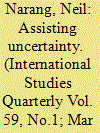

|
|
|
|
|
| Summary/Abstract |
Humanitarian aid has rapidly emerged as a core component of modern peacebuilding and post-conflict reconstruction. However, some practitioners and policymakers claim that humanitarian assistance may actually prolong conflict. The current debate about the effect of humanitarian aid on conflict underspecifies causal mechanisms and takes place largely through case studies. I use a bargaining framework to argue that aid can inadvertently increase each combatant's uncertainty about the other side's relative strength, thereby prolonging civil war. I test my argument using panel data on cross-national humanitarian aid expenditures. From 1989 to 2008, increased levels of humanitarian assistance lengthen civil wars, particularly those involving rebels on the outskirts of a state. This result suggests that policymakers need to carefully consider whether the specific benefits provided by humanitarian aid outweigh the risk of prolonging civil conflicts, and to look for methods of disbursement that reduce that risk.
|
|
|
|
|
|
|
|
|
|
|
|
|
|
|
|
| 4 |
ID:
138296
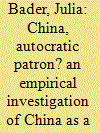

|
|
|
|
|
| Summary/Abstract |
Critics frequently accuse China of acting as a patron for autocratic states. But does Chinese engagement actually increase the stability of authoritarian clients? This article demonstrates that Chinese bilateral interactions have little effect on the longevity of autocratic regimes. Analyses of different forms of Chinese bilateral engagement between 1993 and 2008—including state visits, arms trading, aid projects, economic cooperation, and trade dependence—show that only export dependence on China may increase the likelihood of survival for autocratic regimes while doing little to stabilize their democratic counterparts.
|
|
|
|
|
|
|
|
|
|
|
|
|
|
|
|
| 5 |
ID:
138301


|
|
|
|
|
| Summary/Abstract |
What determines the location of those human rights international non-governmental organization (INGO) resources found outside of the highly developed Western democracies? We draw a distinction between the bottom-up mobilization processes driving the location of human rights organization (HRO) members from the top-down strategic concerns driving where HRO leaders place permanent offices. In particular, we find that, while political opportunity structures generally increase the likelihood that a state has HRO members, it has a curvilinear influence on the number of HRO secretariats, which typically locate in areas seen as having a higher need for organizational resources. Further, while there is no clear connection between human rights abuses and HRO memberships in a state, HROs' strategic concerns lead them to place offices with reference to both local and neighborhood “need”—in other words, levels of repression.
|
|
|
|
|
|
|
|
|
|
|
|
|
|
|
|
| 6 |
ID:
138305
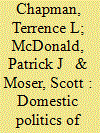

|
|
|
|
|
| Summary/Abstract |
We present a formal model of international bargaining between two states in which one government must negotiate with a domestic opposition faction to secure tax revenue for military spending. The model examines how robust the international order is to domestic political crises that activate a stark trade-off to a governing coalition. Namely, offering fiscal relief to stave off domestic revolution can simultaneously undermine the larger international political order by facilitating military spending that can, under some circumstances, result in sizable shifts in the relative distribution of military power between states. We find that two key domestic conditions influence the likelihood of preventive war: the distribution of income within the state's economy and the relative economic stake that opposition groups possess in international settlements.
|
|
|
|
|
|
|
|
|
|
|
|
|
|
|
|
| 7 |
ID:
138307
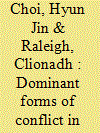

|
|
|
|
|
| Summary/Abstract |
Our article analyzes how transitioning political institutions create incentives and disincentives for opposition groups to incite different forms of political violence. We argue that variation on two specific parameters of governance—checks and balances and political participation—compels states toward one of the three forms of conflict, including civil wars, political militia, and riots. Using disaggregated data on different types of political violence across Africa from 1997 to 2012, we analyzed two parameters of governance in both count and change models. We also identified high-risk conflict periods. Typical regime types (democracy, autocracy, anocracy) cannot explain manifestations of conflict, as violence occurs in regimes with varying levels of political openness and competition. Opposition groups actively respond to regime transitions, as changes in institutional parameters correlate with shifts into alternative forms of violence within states.
|
|
|
|
|
|
|
|
|
|
|
|
|
|
|
|
| 8 |
ID:
138306


|
|
|
|
|
| Summary/Abstract |
How and why do regime type and interstate war affect government spending? We argue that a political leader allocates scarce resources between social and military expenditures as a function of their relative efficiency in securing her political survival. We derive four hypotheses concerning how mobilization for and demobilization from interstate war affects government spending differently in democratic and autocratic regimes. Compared to democracies, autocracies should increase military spending to a greater degree during wartime and decrease military spending to a greater extent following a war. Autocracies also should cut social spending more during an interstate war and increase social spending more during the process of demobilization from war than democracies. Our analyses of all states in the international system from 1950 to 2001 yield support for our hypotheses.
|
|
|
|
|
|
|
|
|
|
|
|
|
|
|
|
| 9 |
ID:
138300
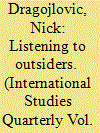

|
|
|
|
|
| Summary/Abstract |
Does nationality disadvantage foreign actors when they attempt to persuade the American public? Using data from an online survey experiment administered to a sample of US citizens, we find that the nationality of British and French advocates only reduces persuasiveness among American Republicans with low levels of political awareness. Among American Democrats, credible French or British advocates can be more persuasive than a comparable American source. Overall, foreign messengers from friendly countries are not disadvantaged by nationality, as nationality has low political salience and other domestic characteristics (such as partisanship) dominate subjects' heuristic processing. When a foreign advocate's nationality does play a role, however, it is likely to lead to polarization in domestic audience attitudes.
|
|
|
|
|
|
|
|
|
|
|
|
|
|
|
|
| 10 |
ID:
138298
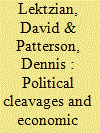

|
|
|
|
|
| Summary/Abstract |
We develop and test a theory, based on the Stolper–Samuelson Theorem, of the effectiveness of sanctions. We treat sanctions as exogenously imposed changes in a country's exposure to international markets. In a country with an open-trade regime, owners and intensive users of the abundant factor of production hold economic and political power. In a country closed to trade, however, economic and political power rests with owners and intensive users of scarce factors. Thus, if real rates of return to the abundant factor decline during sanctions against a trade-open country, or real rates of return to the scarce factor decline during sanctions against a trade-closed country, we expect these economically and politically powerful segments of the targeted country to push hard for policy changes that would bring about an end to sanctions. Statistical analysis of sanctions episodes initiated between 1971 and 2000 provides support for the paper's expectations.
|
|
|
|
|
|
|
|
|
|
|
|
|
|
|
|
| 11 |
ID:
138308


|
|
|
|
|
| Summary/Abstract |
Traditional bargaining theory predicts that groups will demand and concede as much as their relative power allows. However, scholars who study bargaining in the civil war context suggest that governments often overcompensate a rebel group to reach an agreement because the rebel group typically feels insecure. This paper argues that depending on the relative power distribution between groups, either a rebel group or government involved in a civil war can feel insecure at the bargaining table. The weaker bargaining participant, whether government or rebel, is expected to feel insecure and thus demand more political power in a postwar state than its power share predicts, while the stronger group is expected to be willing to overcompensate the weaker group to assuage its security concerns. Using a new data set on political power-sharing bargaining during civil war, my analysis supports this expectation.
|
|
|
|
|
|
|
|
|
|
|
|
|
|
|
|
| 12 |
ID:
138295


|
|
|
|
|
| Summary/Abstract |
Conventional wisdom holds that realists support the recourse to war more than just war theorists. I argue that the opposite is true: just war theory produces a more bellicose orientation than realism. Although the two traditions share a set of assumptions about the international system, as well as several underlying logics, the just war tradition's concern with justice leads it to permit many more kinds of war than realism. Thus, if just war theorists wish to restrain violence, they must approach the possibility of achieving justice through war with more skepticism.
|
|
|
|
|
|
|
|
|
|
|
|
|
|
|
|
| 13 |
ID:
138294
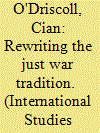

|
|
|
|
|
| Summary/Abstract |
The just war tradition is the predominant western framework for thinking about the ethics of contemporary war. Political and military leaders frequently invoke its venerable lineage to lend ballast to their arguments for or against particular wars. How we understand the history of just war matters, then, for it subtends how that discourse is deployed today. Conventional accounts of the just war trace its origins to the writings of Saint Augustine in the 4th century CE. This discounts the possibility that just war ideas were in circulation prior to this, in the classical world. This article contests this omission. It contends that ideas homologous to a range of core jus ad bellum, jus in bello, and jus post bellum principles were evident in classical Greek political thought and practice. This finding challenges scholars to re-consider not only the common view that the just war is, at root, a Christian tradition, but also the relation between victory and just war, the nature of the ties binding just war and Islamic jihad, and an innovative approach to the comparative ethics of war.
|
|
|
|
|
|
|
|
|
|
|
|
|
|
|
|
| 14 |
ID:
138304
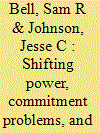

|
|
|
|
|
| Summary/Abstract |
Many scholars argue that leaders' expectations about future shifts in the distribution of power can result in preventive war. If a leader expects her adversary to be significantly stronger in the future, the leader may choose to go to war with that adversary rather than bargain with a stronger adversary in the future. However, quantitative evaluations of this argument prove difficult, as they require a measure of leaders' expectations about future shifts in power rather than simply a measure of observed power. In this paper, we develop an empirical model of future power to create this measure. We then use that measure to evaluate the preventive war hypothesis. Our results support the preventive war hypothesis. Increases in a state's expected future probability of winning in war increase its probability of another state in a dyadic relationship initiating war against it.
|
|
|
|
|
|
|
|
|
|
|
|
|
|
|
|
| 15 |
ID:
138299


|
|
|
|
|
| Summary/Abstract |
Does contact with democratic governance make state officials in authoritarian regimes more democratic? While studies of democratic diffusion are built on the inherent assumption that exposure to democratic practices shapes the attitudes of domestic actors toward democracy, scholars of international socialization are more skeptical about such micro-effects. Drawing on insights from sociology and social psychology, I examine what type of cross-national activities can socialize Moroccan state officials into democratic governance. The results of cross-sectional, multivariate regression analyses based on original survey data emphasize that, in authoritarian contexts, transnational linkage manifests the potential to democratize only if it involves practical experience, a condition fulfilled by cooperative exchange within transgovernmental networks, but not by more diffuse types of linkage such as international education and foreign media broadcasting.
|
|
|
|
|
|
|
|
|
|
|
|
|
|
|
|
| 16 |
ID:
138303
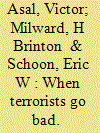

|
|
|
|
|
| Summary/Abstract |
The intersection of terrorism and organized crime is a central global security concern. However, the conditions that contribute to this intersection or hinder its development are widely debated. Drawing on prominent cases of ideologically driven violent nonstate actors engaged in illicit economies, some scholars argue that this intersection is a logical evolution. Other scholars, focusing on the fact that relatively few groups engage in both organized crime and terrorism, argue that ideological differences hinder this intersection. We use data on 395 terrorist organizations to analyze how organizational and environmental factors affect the likelihood of terrorist involvement in illicit drug trafficking. Our analysis shows that the degree of connectivity within networks of terrorist groups is the most significant predictor of a group engaging in drug trafficking. Further, contrary to the theorized effects of ideology, an explicit religious ideology has no significant effect while an ethnopolitical ideology actually increases the likelihood of drug trafficking.
|
|
|
|
|
|
|
|
|
|
|
|
|
|
|
|
|
|
|
|
|